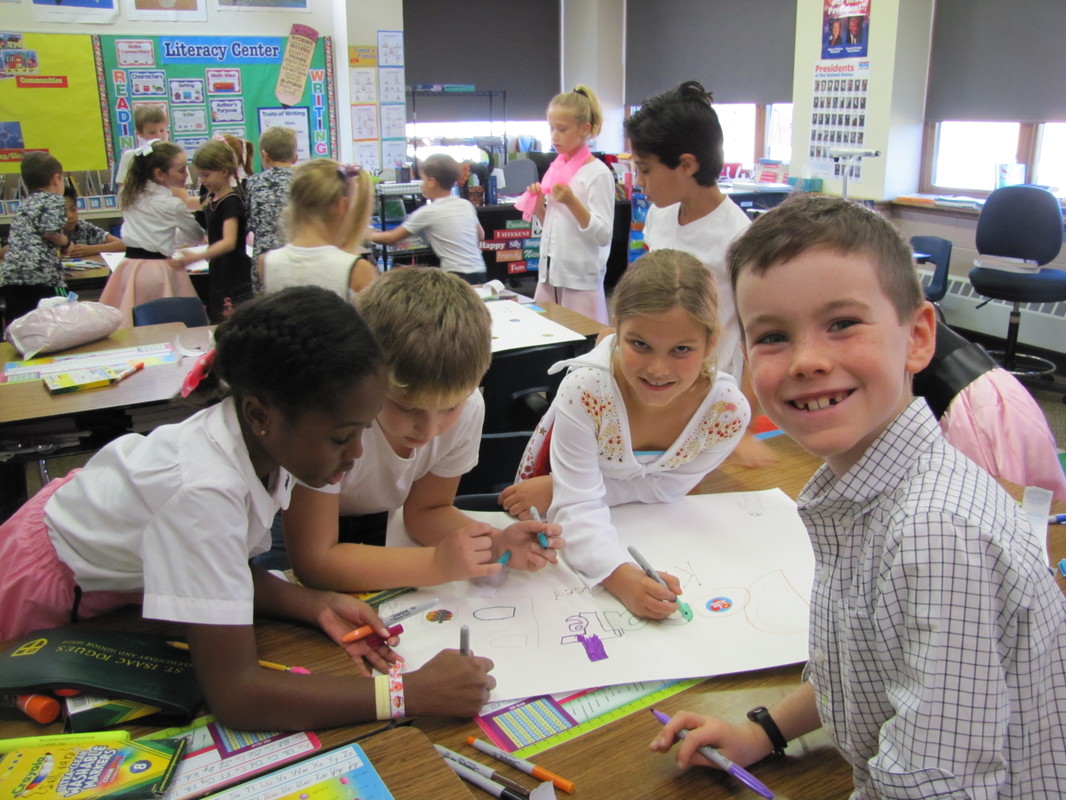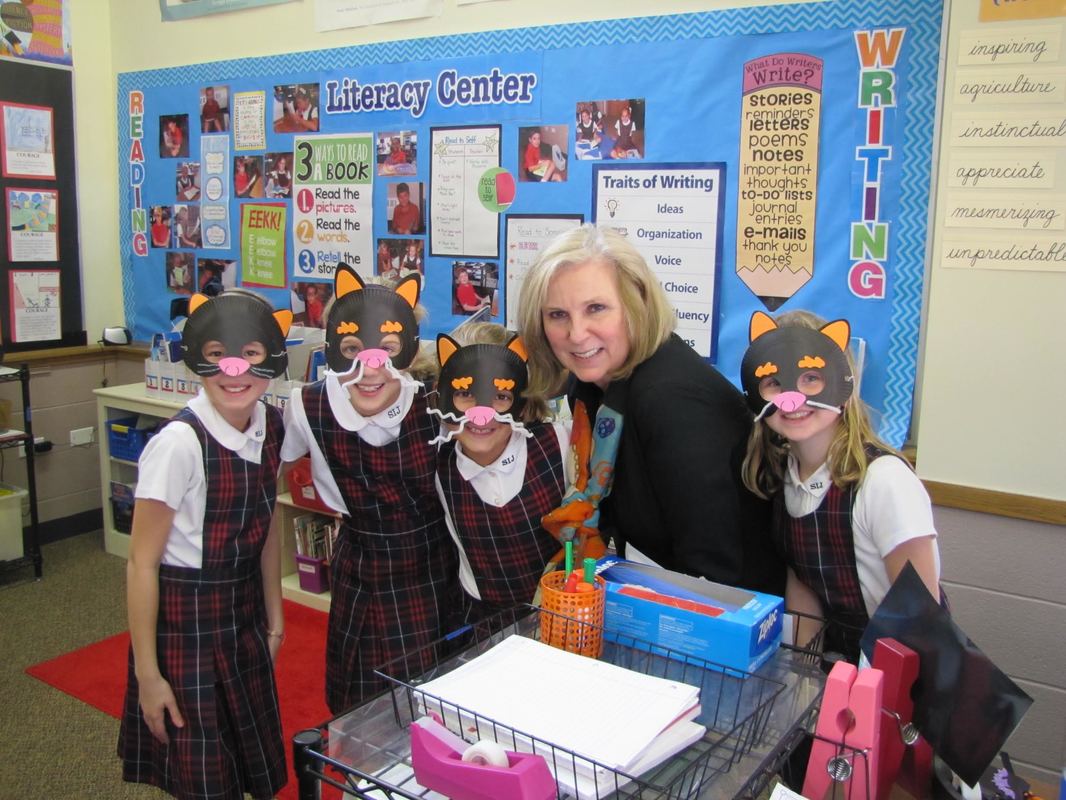3rd Grade Curriculum
Religion
Students will learn through stories, activities, Scripture, prayer, discussion, and reflection about the Catholic faith. Catholic values are discussed and integrated into all subject areas. Concepts include a study of:
- the church as a faith community;
- the mysteries of faith—the Creed;
- the Kingdom of God;
- service to others;
- prayer and the Rosary; and
- family life.
Language Arts
Students will develop skills to enhance their reading and writing. Concepts include a study of:
- phonics, decoding and spelling;
- critical thinking;
- parts of speech and mechanics of writing including editing;
- vocabulary;
- handwriting—correct formation of letters;
- oral presentations;
- the writing process; and
- different types of writing (e.g. narrative, persuasive, expository, & descriptive).
Reading
Students will develop fluency, comprehension and interpretation of written information, use correct spelling and punctuation and communicate well in speech and in writing. Concepts include a study of:
- vocabulary;
- drawing conclusions;
- making predictions;
- sequencing stories;
- using graphic organizers for information; and
- daily oral editing.
Mathematics
Students will acquire a knowledge of mathematics and applied mathematics to solve problems using textbooks, activities, technology and hands-on experiences. Concepts include the study of:
- addition and subtraction of 2 and 3 digit numbers;
- multiplication and division;
- collection and organization of data;
- geometry;
- fractions; and
- measurements and decimals.
Social Studies
Students will develop an awareness and understanding of our nation and appreciate the cultural similarities and differences among various societies. Concepts include a study of:
- communities in history;
- culture of Native Americans;
- study of ancient civilizations;
- Chicago history, economic development and architecture;
- map skills/geography;
- landforms;
- U.S. government; and
- research using technology.
Science
Students will use hands-on experiences, technology and critical and analytical thinking skills to observe, question, predict and explain. Concepts include a study of:
- life cycles and food chain;
- forces and machines;
- landforms, water and weather;
- plants and animals; and
- ecosystems.
Physical Education
Physical fitness and well being will continue to be encouraged by learning and exploring activities that affect a healthy lifestyle. Concepts include a study of:
- change of direction and speed;
- kicking, throwing, walking, marching, balancing, jumping, etc.; and
- development of team sports skills; and
- simple games and small group activities which challenge students and foster creativity.
- ball and agility games;
- manipulative skills (bean bags, kicking, throwing, trapping, rolling, etc.);
- movement (walking, marching, marking, hopping, etc.);
- parachute;
- long and short rope jumping;
- team sports; and
- and recreational games.
Art
Students will draw and paint using a variety of materials such as pencils, crayons, chalk, oil pastels, marker, Tempera and watercolor. Concepts include:
- understanding, recognizing and defining elements of design;
- working with techniques in printmaking, paper construction, patterning, and weaving;
- exploring and creating Native American animal, environmental, and architectural art forms;
- being introduced to animation and film making; and
- using iPads.
Music
Students will have the opportunity to participate in music activities and to develop an appreciation for music. Concepts include a study of:
- singing in groups;
- demonstrating audience behavior;
- writing in standard music notation; and
- performing on classroom instruments.
Information Skills
Third graders study the parts of a book in depth, creating title pages and identifying features of index, table of contents and glossary. Dewey Decimal System and Destiny library catalog are introduced, along with online databases and encyclopedias. Students read and tally totals from the Bluestem book list. Students learn coding through use of Code.org curriculum. Students will:
- understand what is acceptable to share when using the internet;
- know where to find sources using the library catalog & Dewey Decimal System;
- use and cite online encyclopedias for basic research;
- investigate and evaluate various websites, citing main idea and supporting information;
- read biographies and utilize other sources suggested in reference lists; and
- self-select books for checkout with emphasis on keyword searching for titles.
Technology Skills
Students will experience practical applications that enhance the curriculum and encourage critical thinking skills in various subject areas to promote lifelong learning. Applications include:
- gathering data on the internet using teacher directed websites;
- completing research on the internet using “kid-safe” search engines;
- keyboarding;
- graphic designing;
- art skills;
- desktop skills;
- graphing;
- visual story mapping; and
- use of curriculum related software.
STEM
The Project Lead The Way Launch Interdisciplinary Curriculum is designed for third grade students to apply STEM knowledge, creativity, skills, and habits of mind, and discover that trying different approaches and solutions is an essential part of the learning process. Engineering design in third grade engages students in more formalized problem solving. Students define a problem using criteria for success and constraints or limits of possible solutions. The students research and consider multiple possible solutions to a given problem. Generating and testing solutions becomes more rigorous as the third grade students learn to optimize solutions by revising them several times to obtain the best possible design. The students apply newly acquired knowledge and skills as they work as part of a team and utilize the design process to define the problem, sketch, build using available materials, test, and reflect on their designs.
Elements and skills of our Project Lead The Way Launch curriculum for Third Grade include:
Elements and skills of our Project Lead The Way Launch curriculum for Third Grade include:
- The PLTW Third Grade Curriculum includes four modules that bring learning to life: Stability and Motion: Science of Flight, Stability and Motion: Forces and Interactions, Variation of Traits, and Programming Patterns;
- The PLTW Curriculum is aligned with the Next Generation Learning Goals and Standards for Third Grade;
- team collaboration/Leadership skills;
- inquiry- rich content that links reading, communication,and science in every activity;
- problem-based-, project-based, and inquiry-based learning and team collaborative decision-making;
- academic concepts are coupled with real world problems;
- student explore simple machines as they investigate the effects of balanced and unbalanced forces on the motion of an object;
- students investigate the differences between inherited genetic traits and traits that are learned of influenced by the environment;
- students begin to move beyond basic sequential computer programs to discover the power of modularity and abstraction;
- students will start with computer- free activities and progress to programming in a blocks- based language on a tablet;
- students learn how to think computationally about problem;
- organize and maintain an engineering notebook;
- reason abstractly and quantitatively;
- use appropriate tools strategically;
- learning is measured through PLTW rubrics and assessments which use performance-based formative assessments and summative, content based specific assessments;
- STEM lab; and
- PLTW online curriculum, 1:1 iPads, and videography
Resource and Speech/Language Pathology
St. Isaac Jogues School provides on site speech/language and resource services. Curriculum is child specific and designed to meet needs in reading, math and communication skills.





